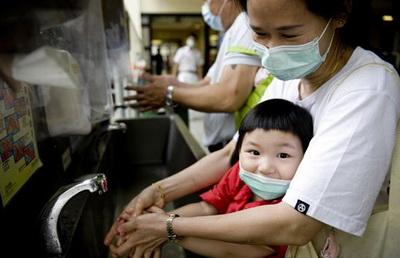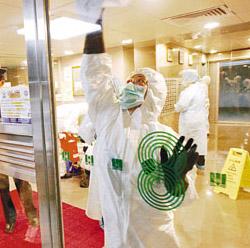 Global health officials' response to the swine-flu pandemic reflects major improvements in flu-fighting capabilities in recent years, but limited vaccine supplies, crowded emergency rooms, and other challenges show they still aren't fully equipped to combat a deadlier scourge, the World Health Organization's chief said.
Global health officials' response to the swine-flu pandemic reflects major improvements in flu-fighting capabilities in recent years, but limited vaccine supplies, crowded emergency rooms, and other challenges show they still aren't fully equipped to combat a deadlier scourge, the World Health Organization's chief said. While a second wave of infections caused by the H1N1 virus has ebbed in North America and Western Europe, transmission of flu remains intense in Central and Eastern Europe and parts of southern Asia, and health authorities must monitor its spread for another year or more, WHO Director-General Margaret Chan said in an interview this week.
'It is premature to say the pandemic has peaked world-wide,' she said. 'The situation needs to be watched and monitored at least another six to 12 months.' The virus could still mutate to become more severe, she warned.
Cases of H1N1 flu confirmed by laboratory testing have been reported in more than 208 countries and overseas territories, the WHO said Wednesday, and at least 12,220 people have died. A third wave is possible, Dr. Chan said, noting that the southern hemisphere could experience another one when its flu season returns in a few months.

Global health officials have far better tools for battling emerging infections than they did 'in 2003 when the world was really scrambling to deal with SARS,' said Dr. Chan, who was director of health in Hong Kong during the outbreak of severe acute respiratory syndrome. She credited countries with 'generous and timely sharing' of information, virus samples, diagnostic capabilities and research expertise in the eight months since the H1N1 virus was identified.
But the world isn't ready for a deadly pandemic like one that officials have feared could be sparked by the H5N1 avian-flu virus, which, though rare, has killed about 60% of the people it has infected, she said. Against a backdrop in which more people suffering from chronic diseases, HIV, and other diseases, and a global recession that has pushed many further into poverty, 'the occurrence of a moderate pandemic will probably rank as the best health news of the decade,' Dr. Chan said.
Related News
Photos
More>>trade
- Ding Dawei, the Mayor of Nantong city inspected ZTT
- Jiangsu Zhongtian Technology presented at Hannover Messe successful
- ZTT OPPC Accessory Fittings and Joint Box have Past the Identification By the
- Zhongtian OPPC Passed China Electricity Council Appraisal
- ZTT Honored the Annual Top 10 Competitive Companies in Optical Communication
market
- ZhongTian Technology, Co., Ltd Supplies OPPC insulated cable for the first 10 kv
- NJUPT and ZTT construct teaching and Practicing Base Ceremony
- Hundreds Elites New Blooded ZTT
- Jiangsu Zhongtian Technology and Zhongtian Hitachi RF Cable attended Communic
- ZTT special conductor presents at overhead transmission line technology
finance
- Comba Establishes Presence in ITU TELECOM WORLD 2006
- Comba Launches Multi-Carrier Tower Bottom Solution & Signs Supply Agreement with
- Comba Named "2009 Hong Kong Outstanding Enterprise" By Economic Digest
- Comba Launches Cell-Split Antenna Portfolio
- Comba Telecom To Supply Latin America s First Multi-Vendor Antenna Optimization





